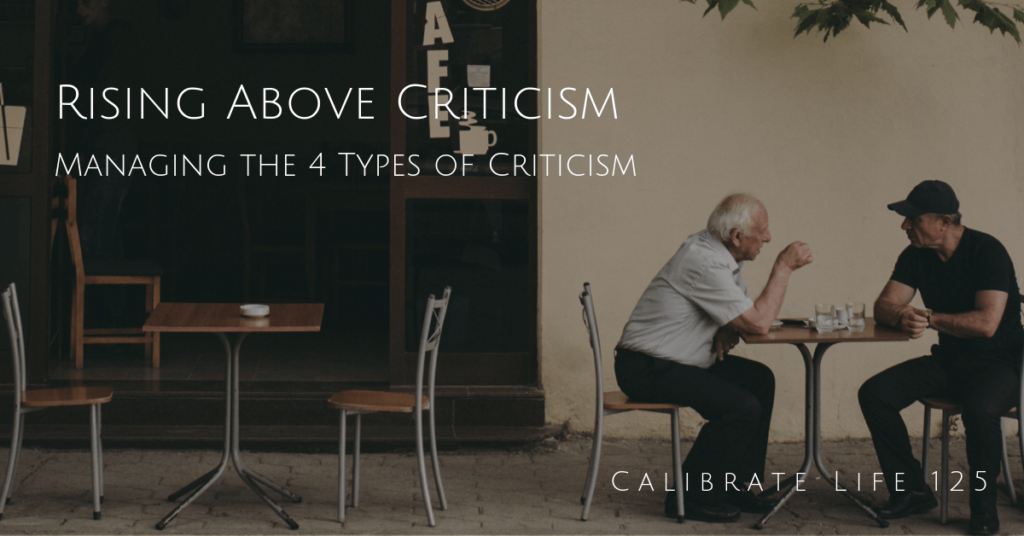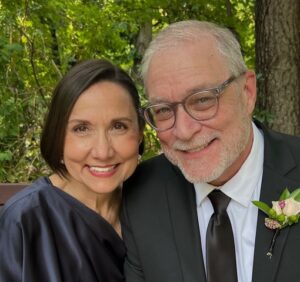Podcast: Play in new window | Download

In leadership, sometimes we are givers of healthy criticism, sometimes we are recipients of healthy and sometimes unhealthy criticism. Dealing with and working through critical points is a component of conflict management and leading a healthy team. In the next two episodes we will discuss how to deal with and rise above criticism.
For the next couple of weeks, when you subscribe to the update you will receive a copy of the ebook, Rising Above Conflict
Continue Reading the Article/Episode Notes…
Rising Above Criticism: The 4 Kinds of Criticism
We always want 5-star ratings. We only want 5-star ratings. It messes us up if we get anything less than 5-star ratings. Maybe we would be better leaders, better people, if we decided 4-stars were better, because an occasional 1-star rating is simply necessary.
By default, I am a thin-skinned-people-pleaser. One single solitary criticism in a sea of positive affirmations throws me off balance. I want to give everyone what they want and expect. I like making people happy. Actually, most leaders are thin-skinned, so I’m not alone and neither are you. By “thin-skinned” I mean they care what people think, because they care about people. Thom Rainer, in his book Breakout Churches, explains that according to his research, effective and strong leaders who have led churches into significant growth have many common characteristics; one of which is they are thin-skinned. But wait, “Leadership 101” teaches us that leaders have to develop the thick skin of a rhinoceros. We’ve been taught that true leaders are impervious to criticism. Not so!
“(Effective spiritual leaders) are sensitive to criticism, but they do not let their critics deter them from the goals and visions they sense God has given them.”
Thom Rainer in “Breakout Churches”
Rainer says this of the leaders he researched, “In all of the breakout church leaders, we saw very caring (leaders). They said that most of the struggles they experienced were necessary, but the loss of members and the constant criticisms hurt them deeply. Criticisms did not just roll off them. They dealt with the critics and persevered but often at great personal cost.” Rainer summarized by stating, “(Effective spiritual leaders) are sensitive to criticism, but they do not let their critics deter them from the goals and visions they sense God has given them.” We want to please people because we love them. We are being thin-skinnedwhen criticisms hurt us, but we courageously move forward anyway because it is right, and we are accountable to God.
Jesus said, “There’s trouble ahead when you live only for the approval of others…popularity contests are not truth contests” (Luke [6:26], The Message).
Criticism is Inevitable – It Comes with Action and Leadership
“To avoid criticism say nothing, do nothing, be nothing.”
Aristotle
I do not like criticism, it hurts; but if I never get criticized, I’m probably flying too far under the radar. I’d rather be criticized for what I’m doing than for what I’m not doing. When we constantly avoid conflict we will be criticized for what we aren’t doing. When we move forward with conviction we will be criticized for what we are doing. Take your pick.
If we aren’t watchful, our leadership will lack effectiveness because we are too accommodating. Everyone isn’t going to like everything, but those who have a mind to be on the team and have constructive input will continue to help us.
Take note of this excerpt from a speech Theodore Roosevelt delivered at the Sorbonne in Paris, France in April of 1910.
“It is not the critic who counts; not the man who points out how the strong man stumbles, or where the doer of deeds could have done them better. The credit belongs to the man who is actually in the arena, whose face is marred by dust and sweat and blood; who strives valiantly; who errs, who comes short again and again, because there is no effort without error and shortcoming; but who does actually strive to do the deeds; who knows great enthusiasms, the great devotions; who spends himself in a worthy cause; who at the best knows in the end the triumph of high achievement, and who at the worst, if he fails, at least fails while daring greatly, so that his place shall never be with those cold and timid souls who neither know victory nor defeat.”
Theodore Roosevelt, Sarbonne, Paris, France 1910
Wrapped up in criticism are positives and negatives. The positives involve constructive and truthful insights from friends. Proverbs 27:6 says, “Faithful are the wounds of a friend; profuse are the kisses of an enemy” (ESV). The negative can be destructive and abusive. We need to understand the difference, embracing the truth and dealing with the destructive.
We Do Take Criticism Personally
Our supporters tell us, “Don’t take it personally.” We understand this mentally, but it is very difficult emotionally. Why? The more passionate our leadership the more personal the criticism feels. Your work and efforts are an extension of yourself. Others may think they are criticizing a ministry, a leadership decision, or the way a job was done; but in your mind, they are criticizing you. This is not business—it’s personal.
When criticism doesn’t sting it means you don’t care. When you care it always stings and it always feels personal. Sometimes criticism is helpful and healthy, sometimes it is destructive and damaging, and sometimes we have to find the truth buried in negativity that will make us better. How can we move forward with conviction and navigate criticism in a healthy way?
We need to be able to identify the types of criticism, understand the context of criticism, and discover how to deal with criticism.
The criticism that damages is that which disparages, dismisses, ridicules, or condemns. It is frequently vicious but vague and difficult to refute.
-Julia Cameron in The Artist’s Way
Four Kinds of Criticism
Most criticism falls into two categories: constructive and destructive. It’s important to identify the differences and nuances in between. Constructive input makes us better; some criticism at first glance seems totally false, but later we discover that gold nuggets of truth were nestled within the negativity; and some criticism is downright destructive.
Damaging Criticism
In her book, The Artist’s Way, Julia Cameron identifies damaging criticism in this way, “The criticism that damages is that which disparages, dismisses, ridicules, or condemns. It is frequently vicious but vague and difficult to refute” (loc. 1514).
When criticism’s aim is discrediting or belittling someone, it is damaging and evil. It is one thing for someone to disagree with a leader; it is another to try to erode confidence in the leader. The focus is not on reconciliation or growth; the focus is upon tearing down. When criticism takes the form of ridicule or condemnation, it is damaging. In fact, it may even be abusive. As a leader, do not entertain such criticism, no matter its direction.
Misguided Criticism
Sometimes people mean well, but because they lack information what they think is helpful and constructive actually has an adverse affect. This is the kind of criticism that we need to “let go in one ear and out the other.” Oh yeah, it still stings, but the heart of the giver is probably not evil.
I clearly remember, in our first youth pastorate, the senior pastor’s wife pulled my young wife aside and told her she should not wear the same dress so often because people would think we were not being paid enough, and that was an embarrassment for the pastor. Actually, they paid me $75 per week and she only had a few dresses. Only one or two of them were nice. That hurt. I knew the lady’s heart, and it was well meaning. She had a desire to mentor and help. She was ignorant in this case and was often overbearing—bless her heart! Sometimes we are criticized for things we cannot change, things in which we are doing our best. In these times, we need not look for truth in a statement, because they are hurtful comments with little or no remedy. When the criticism has no redeeming value, discount it and categorize it as ignorance. If you are in danger of becoming bitter, then address it and acknowledge that you will not accept the criticism and you will try to separate the person from their ignorance and continue to love them.
Partial-Truth Criticism
I’ve found that most criticism, if listened to with an open heart actually contains some truth. I always try to hear what people have to say in an attempt to grow. It doesn’t mean I am going to do everything they suggest, and it doesn’t mean that I agree with them, but I try to take every opportunity to grow. Most criticism we face as leaders, especially such that doesn’t fall into the previous categories, has redeeming value.
We must understand, in order to extract truth from criticism, we must apply special effort and skill. Skill is developed through time and practice. We must become proficient in sifting criticism. We have to “separate or obtain” the truth from the exaggeration. Distillation is separating purity from impurity. We apply the solvent of the Word and our revelation to the criticism and focus upon what remains.
“We must become proficient in sifting criticism. We must ‘separate or obtain’ the truth from the exaggeration.”
Constructive Criticism
Is there such a thing as constructive criticism? Yes, I think so. Abraham Lincoln said, “He has a right to criticize, who has a heart to help.” Ralph Waldo Emerson said, “Let me never fall into the vulgar mistake of dreaming that I am persecuted whenever I am contradicted.” Proverbs 27:6 says, “Faithful are the wounds of a friend….”
How do we know if criticism is constructive? Consider the source, the context, and the heart.
My yearly reviews with employees are short, because I do not accumulate lists. If I have a problem, observation, or evaluation, I deal with it one thing at a time; and I deal with it specifically and in a reasonable time frame—or I let it go because it isn’t important enough to mention.
I don’t want surveys without names unless they are targeted to a specific audience and we need a cumulative perspective. Evaluations sometimes help us with accountability, designing new directions, and solving problems, but they are only valuable if we can assign some context.
Does the person offering the criticism have your best interest at heart? Is the critic engaged in the organization or are they a spectator? Is the critic a stakeholder? If the critic is a friend, a mentor, a spiritual mother or father, or someone that has the right to speak into my life, I will accept it and dig for the nuggets of truth. If the critic is a credible person whom I believe to have the right heart and motivation, I will listen and give much thought to the input.
For Evaluation: Calibration Tools
- Does the critic have our best interest at heart?
- Is the critic engaged in the organization or are they a spectator?
- Is the critic a stakeholder?
- Does the critic have a right to speak into your life?
- Is the critic credible?





